I was able to solve using flatten function - but dont know how it worked :(
In your original question, it is not exactly clear to me what is your end-goal, so I will try to provide some references.
value filtering
First, your PurchaseOrders -> pledgedDocuments -> valuation -> value appears to be a string, so in your original question trying to filter by
QUOTE:
... [valuation.value=62500]
will not help you.
You'll need to filter to something more ~like: valuation.value="62500"
list projection
In your original question, you are projecting on the PurchaseOrders which is a list and accessing pledgedDocuments which again is a list !
So when you do:
QUOTE:
PurchaseOrders.pledgedDocuments (...)
You don't have a simple list; you have a list of lists, it is a list of all the lists of pledged documents.
final solution
I believe what you wanted is:
flatten(PurchaseOrders.pledgedDocuments)[valuation.value="62500"]
And let's do the exercise on paper about what is actually happening.
First,
Let's focus on PurchaseOrders.pledgedDocuments.
You supply PurchaseOrders which is a LIST of POs,
and you project on pledgedDocuments.
What is that intermediate results?
Referencing your original question input value for POs, it is:
[
[{"valuation" : {"value" : "62500"} }]
]
notice how it is a list of lists?
With the first part of the expression, PurchaseOrders.pledgedDocuments, you have asked: for each PO, give me the list of pledged documents.
By hypothesis, if you supplied 3 POs, and each having 2 documents, you would have obtained with PurchaseOrders.pledgedDocuments a resulting list of again 3 elements, each element actually being a list of 2 elements.
Now,
With flatten(PurchaseOrders.pledgedDocuments) you achieve:
[{"valuation" : {"value" : "62500"} }]
So at this point you have a list containing all documents, regardless of which PO.
Now,
With flatten(PurchaseOrders.pledgedDocuments)[valuation.value="62500"] the complete expression, you still achieve:
[{"valuation" : {"value" : "62500"} }]
Because you have asked on the flattened list, to keep only those elements containing a valuation.value equal to the "62500" string.
In other words iff you have used this expression, what you achieved is:
From any PO, return me the documents having the valuations' value
equals to the string 62500, regardless of the PO the document belongs to.
